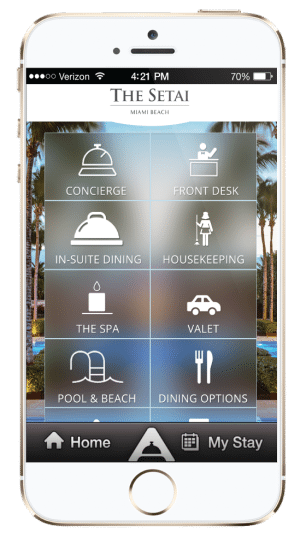Expedia Leads $9.5 Million Investment in Hotel Platform Alice

Skift Take
Expedia has led a $9.5 million minority investment in Alice, which provides a back-end platform for hotel operations and a guest app for communications with hotel staff, as Expedia continues to follow Booking.com and TripAdvisor into the business side of the hotel industry.
Alice and Expedia announced their ties at the Expedia partner conference in Las Vegas on December 9 but didn’t provide much detail on the investment or partnership until today, though the exact amount Expedia contributed to the round remains undisclosed. This latest round pegs Alice’s total funding at about $13 million since it was founded in 2012, with 645 Ventures and Laconia Ventures also participating in this round.
Alice offers a software-as-a-service platform to hotels that enables multiple departments within a hotel to respond to guest requests and provides reporting and analytics. Guest requests are then assigned to specific employees and every step of the process is tracked from start to completion. In addition, the Alice app enables guests to communicate with front-of-the-house staff via SMS messaging.
Alexander Shashou, co-founder and president of New York-based Alice, said the investment lets the company leverage Expedia’s immense database of hotel partners. Expedia’s role in the partnership is otherwise unclear as the company didn’t comment on how if it will market Alice to its partner hotels. Expedia previously signed a deal with CheckMate, which helps hotels facilitate mobile check-ins.
Shashou said nearly all of the 100 hotels using Alice are existing Expedia partners and he’s aiming for Alice to sign-on another 300-500 properties by the end of 2016. Some 75 hotel companies that Alice does business with have more than 700 properties between them. Partners include Sixty Hotels and Viceroy Hotel Group.
Helping Guests and Hotel Staff
Guests’ preferences are on file with Alice if they’ve stayed at the hotel before and data on all guest requests are codified for staff to help streamline operations. The hotel can also text guests before they arrive to ask if they’d like anything in particular waiting for them in their room, for example, and a guest can also text the hotel before arriving. Text messages come through to Alice’s back-end platform for staff.
“Our challenge is how do you simplify letting guests choose how they communicate with hotel staff but at the same time bringing that all to the same back-end,” said Shashou. “The bounds of hospitality have changed. This platform has the ability to transcend hotels and [Alice] is working heavily with residential units and work spaces as well.”
Alice creates white label apps for its hotel clients like the one pictured below for The Setai Miami Beach:
Source: Alice
Guests would still find Alice if they haven’t downloaded the hotel’s app on their device. After connecting to a property’s Wi-Fi guests are redirected to Alice, which gives them the option to download the app. That’s unlike many other hotels where guests are brought to a property’s booking site after connecting to Wi-Fi. That doesn’t make sense if the guest has already booked and is already on-property, said Shashou.
“With Uber I can watch the car come to and leave from me, but nothing like that happens in a lot of hotels today,” said Shashou. “Guests want to know that if they asked the front desk to do something for them as they’re leaving the hotel for a meeting that it will be done by the time they return.”
“Even if you didn’t make a request via the app, with Alice you can walk past the front desk and request something from the concierge and within five seconds the front desk can plug it in and start the task. Immediately after a guest logs back into the app they see that the task is in progress and can see when it’s completed. For management and staff there’s also a record of how long it took to complete the task.”





